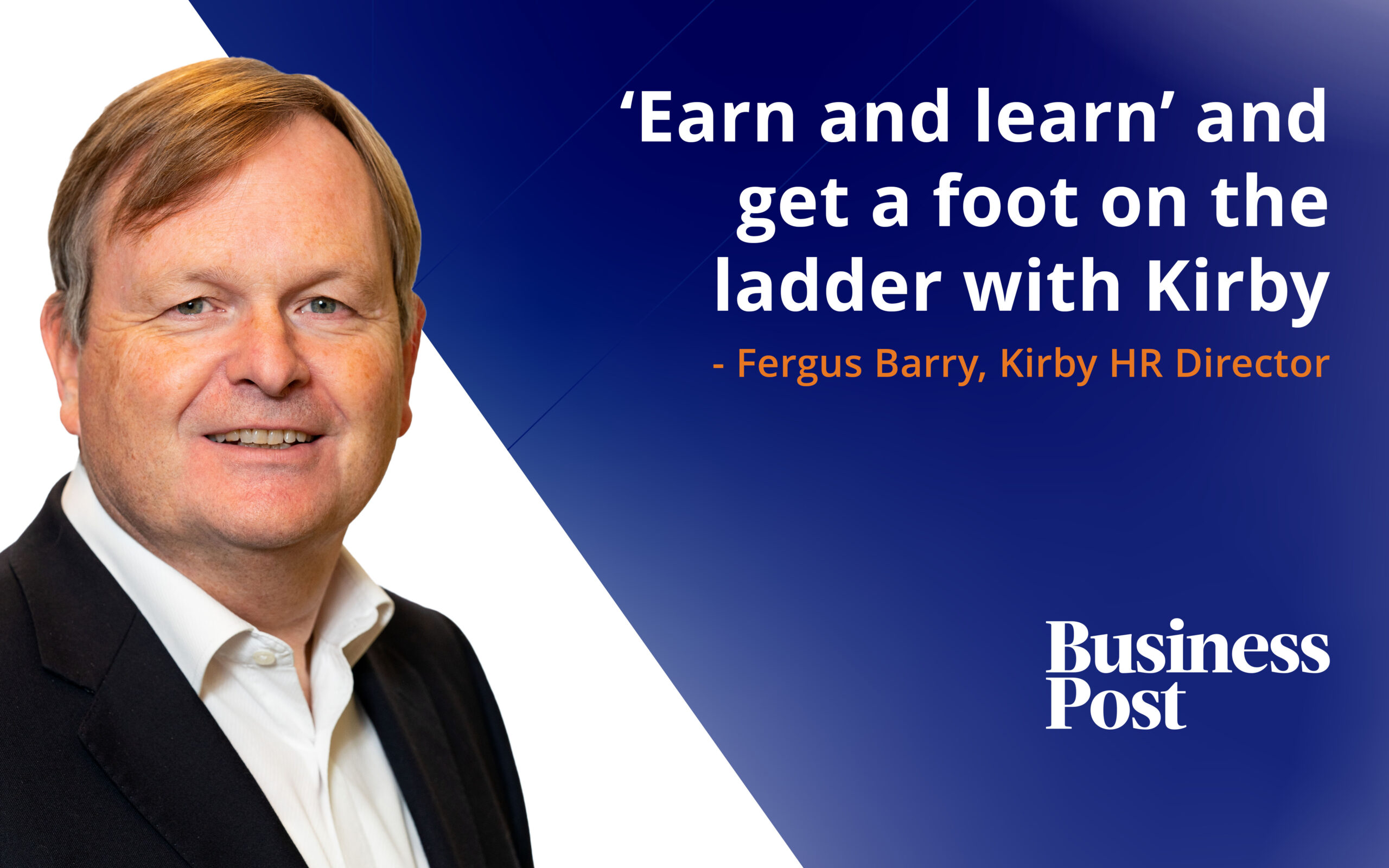Fergus Barry, Kirby HR Director spoke to the Business Post on how Kirby provides great opportunities for people to build their career path.
Providing full mechanical and electrical contracting services, as well as specialist high voltage (HV) and medium voltage (MV) design and construction services to clients across a number of different sectors including data centres, life sciences, industrial, power and renewables, Kirby Group Engineering has great opportunities for people starting out on their career path.
Employing 1,500 people across the Republic of Ireland, mainland Europe, the UK and South Africa, the leading engineering company attracts people at different stages in their working life. It is also a highly desirable choice for apprentices, who apply to join the team where they can ‘earn and learn’ while getting a solid footing on the professional ladder.
Fergus Barry, group human resources director at Kirby, oversees the HR team. The team is focused on attraction of talent, total reward process, training and development, organisational development, performance development, human resources information system (HRIS) and structured talent progression for the leading-edge international engineering company.
Barry said that its apprenticeship programme is of the utmost importance to the firm.
“We are one of the leading recruiters of apprentices in Ireland and our apprenticeship programme aims to develop the best and brightest world-class craft professionals,” he said.
“We ensure our apprentices receive fully rounded training and professional experience, to prepare them for the realities of a career in engineering at the end of the programme – and they are earning whilst they work on some of the leading engineering projects on the planet.”
Kirby has developed its apprenticeship programme delivering leading-edge schemes, covering high-tech work across multiple sectors for leading companies in the sectors in which it operates.
The programme covers a number of disciplines, including electrical, instrumentation, mechanical and sheet metal working. It provides recruits with excellent structured technical training, graduated practical work challenges, coaching and mentoring as well as structured personal development and support. It also runs alongside Solas, with apprentices released for college-based learning throughout their training.
Barry said Kirby Group Engineering has developed its training centre and facilities to offer the best opportunities to apprentices.
“Our apprenticeship programme is constantly developed alongside our internal training programme and the ‘Kirby Way’– the systems and processes which ensure that we deliver excellence on every project,” he said.
“This approach ensures that our apprentices stand at the forefront of the industry, ready to work on engineering projects of the future. We see our apprentices as the leaders of the future.
“Many of our top team and key leaders started their careers as apprentices and there are 210 apprentices on the current programme.
“We are proud to have had a diverse range of entrants on our apprenticeship course, including a number of female trainees, and we have had very positive feedback about their experience. We’re also actively working to improve the gender balance in engineering overall, through a range of initiatives.”
Kirby has worked in partnership with Business in the Community Ireland for 10 years, delivering outreach programmes at Coláiste Chiaráin in Co Limerick and Galway Community College.
Kirby HR business partner Michelle Powell leads the programme, which aims to champion women in engineering in schools and colleges across Ireland.
“It is important to hold these sessions at the age we do, at 13 and 14 years old, because if we wait until college, these young people would have already selected their subjects,” she said.
“We know that there is a lack of representation from certain groups in STEM subjects, so this programme was developed and is evolving in response. We gauge at the beginning of the session how many students would consider careers in engineering, and then again at the end of the series, and there is a huge change in the numbers of young girls putting their hands up.
“For the sessions I bring mostly female colleagues with me as it is important that the young girls in the class can see themselves represented across the spectrum of careers in engineering, from planning, BIM/digital construction, estimating, and the trades on site.”
Talking about Kirby joiners from the programme, she says that the company is starting to see people apply for roles, having been through the programme eight years ago.
“It is a long game and I think it will be another two years until we see a marked impact,” said Powell.
“For Kirby to have supported a programme like this, for as long as we have, shows the vision we have as a company. It’s about the industry as a whole, not just a pipeline for our own future talent. We know that to have a diverse future for engineering we need to invest time now and invest resources in early education.”
Cathal Hanley can attest to this. As a fourth-year electrical apprentice at Kirby, he is thoroughly enjoying the experience and is looking forward to developing his career.
“I really enjoy it on site as the team has been amazing and have so much time for me,” he said. “They are all really invested in my learning, because at Kirby a lot of the people around you have been in your shoes and they are genuinely keen to make sure you become the best electrician you can be.
“I like working with my hands, and seeing the progress that I am making. I have always been intrigued by how things worked.”
To find out more about careers at Kirby go to https://careers.kirbygroup.com/.

